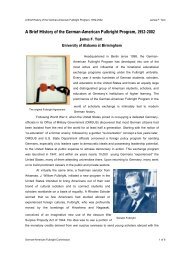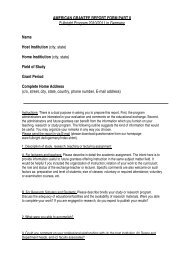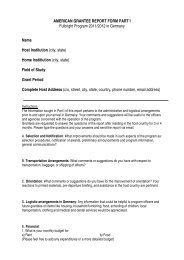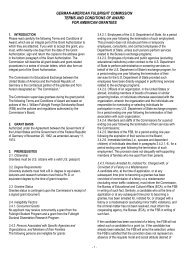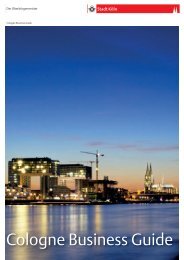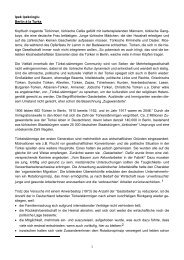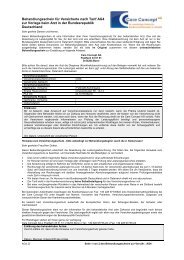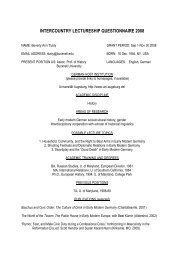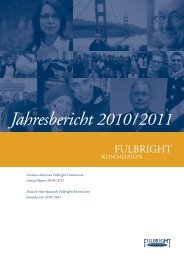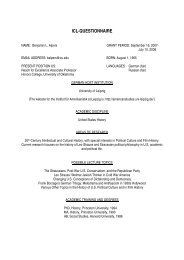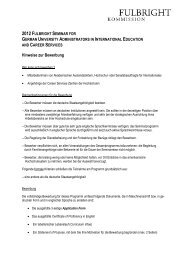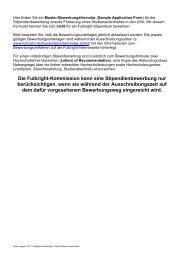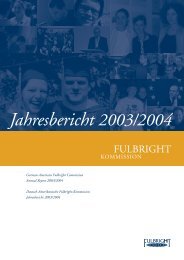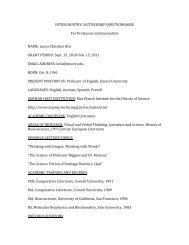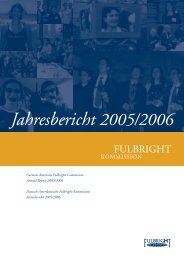The First Class of Fulbrighters - Fulbright-Kommission
The First Class of Fulbrighters - Fulbright-Kommission
The First Class of Fulbrighters - Fulbright-Kommission
Create successful ePaper yourself
Turn your PDF publications into a flip-book with our unique Google optimized e-Paper software.
Tonsor with grandson in 2003<br />
Stephen John Tonsor was born in Jerseyville, Illinois in 1923. He<br />
received an A.B. degree from the University <strong>of</strong> Illinois in 1948,<br />
and a Ph.D. in 1955. Tonsor spent his <strong>Fulbright</strong> year at the Universität<br />
München. Upon returning to the U.S. he became <strong>of</strong> Pr<strong>of</strong>essor<br />
<strong>of</strong> History at the University <strong>of</strong> Michigan (1954-74). Tonsor<br />
was a senior visiting research fellow at the Hoover Institution<br />
(1972-73), Consultant to the Presidents Council <strong>of</strong> Economic<br />
Advisors (1969-72) and has been an Associate <strong>of</strong> the North Central<br />
Association since 1971, among other positions. He has been the<br />
editor <strong>of</strong> the quarterly review Modern Age since 1970 and has<br />
published the book Tradition and Reform in Education.<br />
WHEN I SAW THE POSTER inviting applications for<br />
the <strong>Fulbright</strong> program in Germany, I thought that would<br />
be a very interesting experience. Although I had two years<br />
<strong>of</strong> high school German, when I went to the German<br />
department to complete the application I was told, “You<br />
can’t speak German.” I told them I needed the form and to<br />
write something. It must have been good enough because I<br />
was accepted. I joined 250 new <strong>Fulbright</strong> students and we<br />
sailed from New York to Genoa, Italy.<br />
After our train ride from there to the holiday resort <strong>of</strong><br />
Bad Honnef am Rhein, we were sent to a Gymnasium where<br />
a woman began speaking to us in German. She said, “If you<br />
know German like the mother tongue, go to the first corner.”<br />
Next she said, “If you can understand what I am saying<br />
go to the second corner.” <strong>The</strong>n she switched to English<br />
and said, “If you have ever taken German, go to the third<br />
corner.” (That was me.) Finally she said, “If you have never<br />
taken German go to the fourth corner.” <strong>The</strong> vast majority <strong>of</strong><br />
students went there, presumably singers, artists, writers,<br />
and listen in the crowded lecture hall where Franz Schnabel 2<br />
lectured and where every seat was filled and listeners<br />
spilled out into the aisles was a defining experience.<br />
To attend the smaller and less well attended lectures <strong>of</strong><br />
Berthold Schenk Graf von Stauffenberg 3 was both extraordinary<br />
and humbling. Pr<strong>of</strong>essor von der Leyden was an<br />
occasional guest in our house.<br />
<strong>The</strong> year we were in Germany my wife’s stepfather<br />
was vice-president <strong>of</strong> the American Academy in Rome. He<br />
made it possible for me to see the fantastic collections <strong>of</strong><br />
the Antikensammlung, which, except for a few choice pieces,<br />
was stored away in attics. Other than that, we were able to<br />
see the great collections <strong>of</strong> art only on later visits to<br />
Munich.<br />
MY YEAR IN GERMANY enabled me to finish my<br />
doctoral dissertation, which I probably would have done<br />
anyway, but more importantly it enabled me to understand<br />
both pre-NS Germany and the new Germany which was<br />
being created before my eyes. My ancestors came from Germany<br />
in the 19th century; the Tonsors from Fürstenberg in<br />
the 1850s, the Schmidts from Basel and Saxony Gotha in<br />
the 1860s and the Blazers from Westphalia in the 1870s.<br />
My return to Germany was a voyage <strong>of</strong> discovery in which<br />
I reclaimed an important part <strong>of</strong> myself.<br />
Developing a Taste for Travel<br />
by John Webster<br />
1) Rogation Days: Days <strong>of</strong> prayer, and formerly also <strong>of</strong> fasting, instituted by the<br />
Church to appease God’s anger at man’s transgressions, to ask protection in calamities,<br />
and to obtain a good and bountiful harvest 2) Franz Schnabel (1887-1966),<br />
pr<strong>of</strong>essor <strong>of</strong> history. Forced out <strong>of</strong> the Technische Universität Karlsruhe in 1936 for<br />
opposing the Nazis. Pr<strong>of</strong>essor <strong>of</strong> history in Munich 1947-1962 3) Son <strong>of</strong> Claus<br />
Schenk Graf von Stauffenberg, who was executed as part <strong>of</strong> the plot to assassinate<br />
Adolf Hitler.<br />
and others who were happy to be in Germany but had no<br />
German language skills.<br />
AFTER THREE WEEKS <strong>of</strong> language instruction<br />
we were all <strong>of</strong>f to a good start. Our next adventure was a<br />
walk to Königswinter, the next town where they were having<br />
a wine festival. I was amazed to see people enjoying the<br />
wine spouting out <strong>of</strong> the village fountain.<br />
When I arrived in München, half the buildings<br />
remained destroyed from the war. Housing was scarce. <strong>The</strong><br />
student housing <strong>of</strong>fice at the Universität Munich gave me a<br />
list <strong>of</strong> families who were willing to rent a room. I ventured<br />
on a streetcar to find housing and found a family with a son<br />
my age. <strong>The</strong> parents wanted me to speak English to their<br />
son to help him with his university studies. <strong>The</strong> family<br />
lived in a second floor cold-water flat with a kitchen, and a<br />
single sink and single toilet in the hall. When I wanted to<br />
bathe, I went out to the public baths. <strong>The</strong> parents slept in<br />
one room and I shared a room with their son. A featherbed<br />
kept me warm during the cold winter months.



